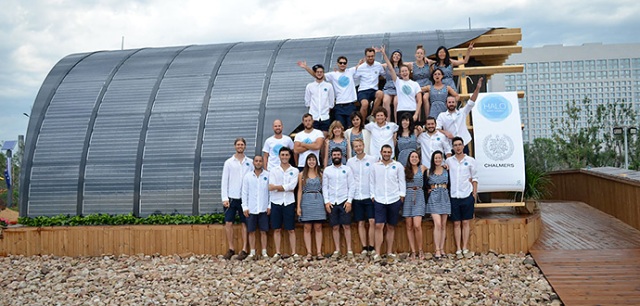Aug 17 2013
The chalmerists' solar energy powered house, Halo, won third place when the international student competition, Solar Decathlon, was judged in Datong, China last Sunday. The team also brought home first prize in the communication section, second prize in the solar application section and third prize in the engineering section.

‘The Swedish team was at the top throughout the competition and finished strongly. I loved the part where we put our shoes into a basket when we entered your house – and that after the round tour we found our shoes in a basket at the exit! The Swedish entry was appreciated by all,’ commented competition founder, Richard King from USA’s energy department, on the Solar Decathlon official web page.
Judged by both jury and public
In the Solar Decathlon students from round the world competed over designing and building solar powered houses. Chalmers is the first Swedish team in this year’s competition in Datong, China. The student house, Halo, was shipped to China by sea in May and assembled on site.
All last week the 20 houses of the competitors were inspected by the public and a jury. The constructions were put through a series of tests.
First prize for their communications
Interest in Halo was marked during the entire week and the chalmerists continually maintained a position in the top three as the points were counted up each day. They came first in the communications section.
The jury made a collective assessment of the participant web sites, video films and the public exhibitions at the Datong site.
‘Halo Sweden started with a very clear concept for their house design. Then they developed a beautiful, simple, and clear visual identity that reflected the design concept of the house itself. They carried that visual identity through everything they did. Their website and exhibit materials are educational, easy to use, and easy to understand. The web site was so easy to use no-one had to think about it', concluded the three-man jury in their motivation and also praised the chalmerists for the way they used social media.
‘Clever, attractive, easy, fun and well-balanced,’ was their collective opinion.
Number two in the best application section
In the section about the best solar application the Chalmers team took the silver medal:
'The second place team approached the competition with an excellent attention to detail – array wiring is nearly invisible and inverter wiring is extremely professional. The PV module mounting is robust and reliable. An innovative design that paired efficiency and passive solar techniques with an appropriately sized array, the jury was impressed by the technically sound and well-detailed design", the jury states in its motivation.
Third best in engineering
Halo came third in the engineering section:
'Halo Sweden combines the design philosophies of the Passiv Haus movement with state of the art solar technologies and high performance HVAC systems. While the systems are commercially available and reliable, they are deployed to produce an elegant and highly efficient system. With an exceptional envelope and sophisticated mechanical ventilation system, the house will be able to maintain excellent air quality and comfort even in the harshest conditions,’ was the motivation expressed by the jury.
Third place overall
Overall, when all points of the competition had been counted up, the Chalmers solar energy powered student housing, known as Halo, won an honourable third place.
The University of Wollongong, Australia won first place with the South China University of Technology team coming in second.
The summing up speech of the competition’s founder
On the morning of the 12th of August the Solar Decathlon in Datong was officially over. Competition founder, American Richard King, thanked all the participants:
'No matter where you go or what you do in life, be proud you were part of something great', he said in his concluding speech.
Richard King founded the competition in USA in 2002, since when it has spread worldwide – first to Europe and now to Asia and China.
‘As the father of the Solar Decathlon I couldn’t be happier,’ said Richard King.
Text: Michael Nystås
Photo: Josua Smedberg